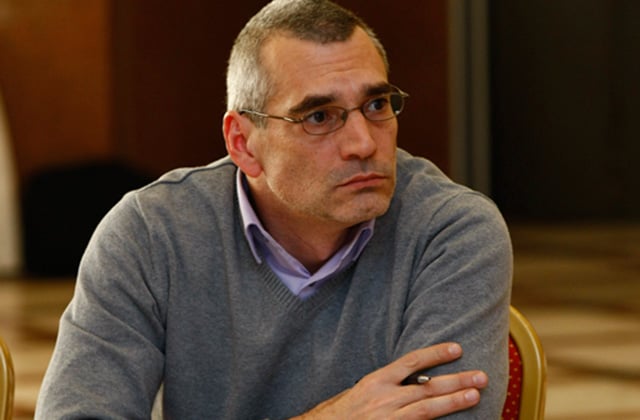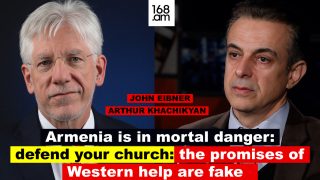“Armenia’s participation in MG peaceful process should be suspended as long as Armenia doesn’t have a partner for peace”

Interview with Richard Giragosian, Founding Director of the Regional Studies Center (RSC).
The third presidential Sargsyan-Aliyev meeting first in Russia, then in New York didn’t take place against the background of regional developments. Parallel to this, the discourse on withdrawal of territories progresses in Armenia. What’s your assessment to the post-war 6 months? Why did the negotiation process appear at a deadlock again?
Unfortunately, it’s again the Azerbaijani side, which prevents continuity of peaceful process. This is not surprising any more. Particularly the fact, that Russia, France or the USA as OSCE MG Co-Chairs, don’t have enough leverages and consistency to bring Azerbaijan back to the peaceful process, is rather disappointing.
What we observed recently, was a failure, when Foreign Ministers of Armenia and Azerbaijan met in New York within UNO General Assembly, and when Azerbaijan clarified that it alienated itself from the peaceful process. In this context we may state, that Armenia doesn’t have a partner for peace.
The international community should recognize the fact that Azerbaijan fails the negotiations, it doesn’t keep its promises, thus, anticipations, referring to installation of investigative mechanisms, weren’t justified.
Thus, Azerbaijan should pay for not getting engaged with the peaceful process. This doesn’t mean that Armenia’s official policy should be changed. Concessions and mutual concessions are necessary from both sides, this requires policy modification, maybe next time RA and NKR authorities should refuse meeting with the Minsk Group, as long as pressures haven’t been exerted against Azerbaijan. Maybe Armenia shouldn’t be the only restrained partner in the peaceful process.
You touched upon the policy by the Armenian side—what lessons did Armenia learn after the April war? What’s your assessment to the activity of Armenian diplomacy throughout recent months?
The first and the most important lesson of the April military operations is that corruption inside Armenia is more serious today, i.e. in the context of April operations, loss of territories, military defeat or Azerbaijani victory, corruption is already a threat to Armenia’s national security.
This is a different situation, a rather serious one, where there are issues on defense purchase, defense armaments, in this field the most corrupt oligarchs and even some generals or RA Chief of the General Staff of Armed Forces Khachaturov are found, they should be substituted. The April war also uncovered “emptiness” of the veterans of the 1990s, for instance, general Manvel Grigoryan or Saroyan, who are in the NA. This shows that corruption, as a threat to national security can’t be acceptable any more.
In its foreign policy the Armenian side should take more forward, powerful step, as I offered, maybe suspend Armenian participation in MG peaceful process, as long as Armenia doesn’t have a partner for peace, and as along as Azerbaijan wasn’t urged to keep the promises, which it was exerted to do.
How do you imagine those pressures on account of the history of conflict settlement process and lack of leverages?
This is a simple issue. It’s not that of Armenia—implementation of mediators’ work isn’t under the responsibility and leadership of Armenia. Russia, as the first supplier of Azerbaijan’s armaments, directly trespasses the position of unbiased or partially unbiased mediator. Maybe Russia should suspend equipping Azerbaijan, in particular, on account of the fact, that basically the armaments provided by Russia, kill Armenians, soldiers of Karabakh.
In an interview with Russian Interfax OSCE MG U.S. Co-Chair James Warlick stated that the USA has a commitment not to sell armaments to Azerbaijan. Was this an occasional observation?
This was a message to Moscow, which emphasizes the fact, that Moscow pursues useless policy within the peaceful process.
What do you think, what should be anticipated from the ongoing situation on NK conflict zone, on account of upcoming changes in the parties to the conflict—forthcoming elections in Armenia and already implemented Constitutional referendum in Azerbaijan?
I have a few observations here. Firstly, there is no more “if,” but only “when”: when Azerbaijan will attack again, for the simple reason that there is no restraint. Nobody and nothing stops Azerbaijan from attacking again. For this very reason “Iskander” system is of crucial importance as manifestation of restraint from the side of Armenia. Secondly, Azerbaijan’s internal destruction makes the attack extremely attractive, opposing to which under these conditions, is becoming difficult. Thirdly, Azerbaijan is dangerously becoming too confident, where even Turkish officials were warned on the threat of regional instability, instigated by Azerbaijan. This also means that Azerbaijan is much more serious and direct threat for regional security and stability, than Turkey.
You touched upon “Iskander” missile system. Some of Russian experts state, that they’ll restore the violated military balance between Armenia and Azerbaijan. On account of the level of Armenia-Russia relations, what do you think, which issue will these systems solve in Armenia?
Firstly, we observe that Russia dangerously changes its already fragile power balance, by providing armaments to Azerbaijan, particularly, when currently Russia negotiates another arms deal with Azerbaijan. The third point for Armenia is that relations between Armenia and Russia are important, they have essential importance, and the issue is not those relations, but conditions of those relations, the asymmetry, haughtiness, by which Russia relates with Armenia, getting Armenia as an endowment, at the same time improving its ties with Azerbaijan.
This means that Armenia should pursue the policy of reforming its relations with Russia, receiving bigger respect and more dividends in Russia’s eyes for the simple reason, that Armenia is the only trustworthy partner in the region, the only state, where Russian military base has been deployed, and the only country in the region, which is a member of both EEU and CSTO.
Thus, on account of this, Russia respects power and not weakness, maybe Russia should start paying for its military bases in Armenia, it refers both Gyumri Russian military base and in Erebuni airport, and pay like Russia pays to the Government of Kyrgyzstan—millions of dollars per year. From the perspective of its relations with Armenia Russia should be more balanced, with respect and less disproportionate, at the same time, Russia should highly respect Armenia, assessing alliance and strategic partnership.
In your opinion, will Armenia’s incumbent authorities restore that respect?
Frankly speaking, there is no any clear answer. However, if we observe the past, when Armenia raised before Russia and defended its independence and sovereignty, we observed more respect from the side of Moscow. I can bring the clearest example: in 2008 after Russia-Georgia war, when Russian authorities officially claimed, that Armenia’s authorities recognized Abkhazia and South Ossetia, Armenian authorities didn’t do it, they were smart and they protected their interests. Thus, we may say that Russia respects power and not weakness. Armenia pledges its national security and underestimated its own sovereignty and independence, this also means that Armenia should focus on pursuing self-sufficient policy being incredulous about any external promise on support, it refers to both the West and Russia.
By Araks Martirosyan

























